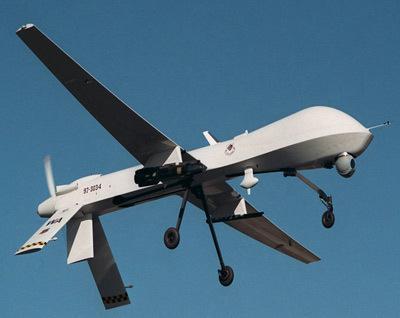
Predator drone. Courtesy: US Air Force
For the record, I am in favor of our drone program, even if the targets are US citizens. I’ll let David Frum and Mark McKinnon lay out the case for me. Lets begin with Frum’s piece:
During the Civil War, Union snipers aimed at Confederate officers. They did so because killing officers demoralized and disorganized rebel units, a valid military necessity. Every one of those Confederate officers was an American citizen. None of them got a jury trial. If they came into view … bang.
Was it a war crime to shoot down a Confederate officer?
Why not?
Within the technology of the time, that person was “targeted” just as surely as any Yemeni al Qaeda operative. The sniper didn’t know the officer’s name or life story. But in the words of the painter Winslow Homer – who witnessed sniper operations during the 1862 Peninsula campaign: sharp-shooting “struck me as being as near murder as anything I could think of in connection with the army.”
War means fighting, and fighting means killing. Those were the words of General Sherman 150 years ago, and they remain true today. They are terrible words, because war is a terrible thing. But there is one thing even more terrible than war, and that is, failing to defend your country against those who have decided to make war against you.
Mark McKinnon’s argument is threefold:
From a totally American perspective, I can think of three justifications. Drone strikes are less costly in terms of dollars. And budgets, we are told, are moral documents. So less money spent on war can go toward human needs, in education, in health care, even in foreign aid.
Second, drone strikes are less costly in terms of lives lost. In a drone warfare world, there is no GI returning with posttraumatic stress, none back with limbs missing. It means less of the kind of knocks on the door that every mother or father or husband or wife who has someone serving overseas dreads. And the technology of precision strikes means that fewer innocent lives are lost among foreign populations living near the field of battle.
Which leads me to my third justification—that drone strikes are less costly in terms of objections in the court of public opinion. Insulated by technology, the strikes appear to us—and more important, to those around the world—on our TV screens as little more than a scene from 24.
McKinnon also points out the important moral argument:
And I believe there is also a moral case for the use of drone strikes in many of the specific cases we have heard about, including that of American-born terrorists like Anwar al-Awlaki. By declaring himself an enemy of the state, calling for a violent jihad against the United States, I believe he ceded his rights to the protections of our legal system.
Those are compelling arguments, in my opinion. For the counter argument, I’ll refer you to The Huffington Post, where you can compare Frum’s case to Steve Clemmons’ from The Atlantic.
I would also add that the lack of evidence is also evidence in this case. We hear the slippery slope argument most, that this can lead to government overreach and abuse of power. If this is the case, I have yet to see any evidence of such.
Remember the slippery slope argument towards government abuse is exactly what gun-rights advocates use to oppose gun control and registration. I find it unpersuasive in both cases.
